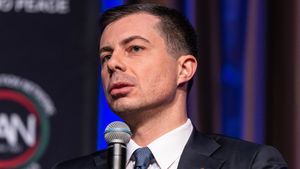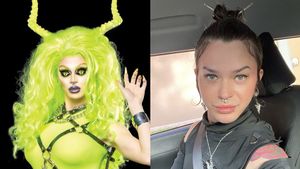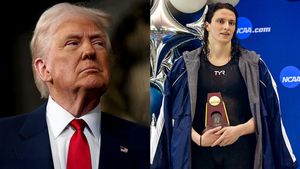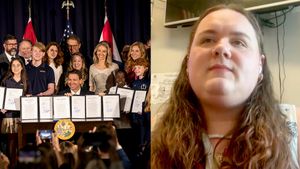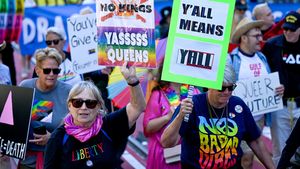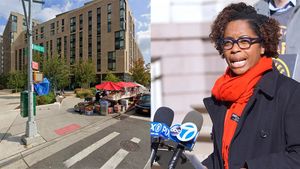With his latest high-profile series, Pose, Ryan Murphy has brought to glittering life the world of 1980s ball culture and New York City queer life. But he hasn't done it alone. For the project, the award-winning mega-mogul enlisted the help of the largest cast and crew of LGBTQ people in television history.
Each Sunday night on FX, Blanca (Mj Rodriguez), Angel (Indya Moore), and Elektra (Dominique Jackson) walk the ballroom floor to one of the greatest soundtracks on TV, serve epic looks and even more epic face, embody the joys and struggles of trans women of color, and solidify the bonds of their unconventional family in what has become a triumph for queer diversity and representation.
Related | Gallery: Every Image From Our Beautiful Pose Cover Shoot
Here, Rodriguez, Moore, and Jackson chat with Janet Mock -- who serves as a writer, producer, and director on Pose -- about making history, filming sex scenes, and the joys of motherhood. Strike a pose and get into it.
Janet Mock: I remember my first day on set, meeting you all and seeing you filming the pilot. Seeing you three, as well as Angelica Ross and Hailie Sahar, was just goosebumps-inducing for me. We really put together a production where these trans women of color are literally taking center stage. What was that moment like?
Indya Moore: Mj and I had worked together on Saturday Church. It was just crazy to do that and we're like, Here we are again, working together. It was just really, really awesome; the connections that were there already, and the connections that were being made. Being a part of it felt like something new, it felt like something that [had] never happened before. Maybe it's because I was around all these other beautiful trans women and trans women of color -- the only time I've ever been around that many trans women was in an afterschool program.
Dominique Jackson: Seeing all of them just filled my heart with so much joy. I felt like there was a special connection to those that had gone before us. When I saw Indya, I felt like it renewed and solidified my belief that something was destined. I met her years ago when she was just a young kid and I was doing work for a non-profit organization. Walking into the room, it felt like family, even with people that I had never met before.

Indya Moore in Versace shirt, skirt, and shoes, Alexander McQueen sunglasses, and Wild and Woolly earrings. Mj Rodriguez in Versace sweater, jacket, and pants, Christian Louboutin shoes. Dominique Jackson in Versace sweater, jacket, and skirt, Falke stockings.
JM: Were you conscious, as you were acting and embodying your characters, of the history in making this?
Mj Rodriguez: I was pretty conscious of the history that I was making, but there was some numbness in that I didn't want to see it because I was just so, so enamored with what was happening when I arrived. But then after a while I just played Blanca knowingly of my sisters, knowingly of what we're going through. After I got outside of my nervousness and my insecurities, I saw that there were women around me that I felt comfortable with. I lived in that and I learned from it. And also I learned from them. That's what made it easy for me just to stay grounded in the history and stay grounded in the work that I was doing alongside them.
IM: When I first started, I was really scared month to month, just surviving on modeling jobs and the kindness of others. So to [get to] like, this, you know, I wasn't even able to adjust. I didn't even have my own home when I first started shooting. I was in a pretty crappy rent situation and everyday was like, Oh my god, wow. I can't believe waking up to a job, being an actor on a mainstream television show as a trans person from the Bronx [laughter] from foster care. It didn't hit me, the history that we were making, until I had different conversations with the people around me and with my manager. He brought it to my attention that this has never been done before, like, Do you know what you're doing?

Dominique Jackson and Mj Rodriguez in Jeremey Scott.
JM: Not only do we have five trans women of color as series regulars on the show, but we also have a huge team of our people behind the scenes. Writers like me and consultants, choreographers -- you know Leoimy Maldonado as well as Mia Schaffer helped organize all the ball scenes and the dance rehearsals. How did those trans women help you and help you do your work?
MR: Leoimy is everything to me. I looked up to Leoimy ever since I was 14 when I was going to balls and now she's my house mother. It's wonderful how things come full circle when you're inspired. Leoimy is a great teacher and a great nurturer, too. And that actually helped me with my character, Blanca. Who better to learn from than her, seeing as I looked up to her as a kid?
DJ: Seeing trans women behind the scenes writing, on the set, actually working -- that just made me feel like we have done the work. And we will continue to do the work to make sure that we get to be viewed and our stories get to be told. And it also made me personally feel safe to know that Janet Mock was writing, that Lady J was writing, because they have trans experiences.
JM: When I was first brought to the project and met Ryan for the first time, he knew he couldn't tell this story alone. It wasn't his role as a white, cis, gay man to tell this story but he wanted to tell it -- the only way he knew to tell it right was by assuring that he brought all of us on the project and was actually listening to us. Was there ever a time for you all where you had to offer your input on something in the script or during the shoot for things that didn't quite feel authentic?
DJ: Yeah, that was in telling the story of the girls at Show World and the way the script was written it was like these women were haggard and not well -- I hit the brakes. I just informed them that the women, the trans women, that worked at Show World back in the late '80s and '90s were actually fancy; these women were well put together, they made money, thousands a day. We idolized those women because they were showing us the only possible way to actually live normal lives.
MR: I want to thank Ryan for being so hands-on with each and every one of us and asking us questions, just so that he [could] get the authenticity of the show. I think that's what he wanted to do from the beginning, and not many directors give you [the] opportunity to do that. Ryan gave us all a lot of range to figure out how we wanted to undress the characters. Sometimes he would talk to us and we would say, 'Oh, can you do this? Do you feel this would be possible?'

Indya Moore in Coach coat, DSquared2 shoes.
JM: You know, Dominique and Indya, you both have romantic storylines on this show. I wrote both of your sex scenes -- for Angel and Stan in episode three as well as for Elektra and Dick in episode four. In showing and embodying those roles, specifically for trans women who have not undergone bottom surgery -- but then also having sex with cisgender, straight men -- what was important for you as actors in telling that story?
IM: There were so many parts of that scene that were very important to me. One of them was the comfort of the actor playing the man who's supposed to be into Angel. In my own personal interactions with men, I'm still used to feeling like there's a second-guessing -- Is he really comfortable, does he really desire me, is this really okay with him? I think I had that initial reaction also with Evan Peters playing the character. A lot of the time, I'm like, Oh man, I hope Evan is comfortable. You know, there were flashes of like, Oh my god, is he regretting taking this role? And I'm thinking, me as a trans woman, my body was the cause. I'm an actor and it's just really interesting hearing myself say this out loud. Another part that was really important for me as Angel was to make sure that the intimacy was very authentic. I was thinking about my other relationships that I had, and how I felt being loved by someone who really, truly loves me -- but also that feeling comes from the stance of not having been loved very much throughout my life by people I love. It was like bringing that back, what that felt like, that great yearning for intimacy; that yearning to be touched in a loving way. She's never been touched outside of being seen as a sexual opportunity or a sexual financial exchange. Angel's never really conceptualized her body outside of those terms.
DJ: A lot of trans women of color have felt that approaching surgery was something they could never possibly achieve. Not only financially but from a mental perspective. I love the way Janet wrote the scene. It was tender and yet it was still a woman fighting for her own independence. It was about trans women realizing that they can achieve full-blown gender operation surgery and they should go towards that no matter what's possible. It has to be up to them. It was very important for me to make sure that I got the message across that we are desired, that people do want us, and people do have affection for us -- but there's a struggle between being with us and having these relationships be open. With these closed relationships, only they have access to us which makes us, on one hand, feel like property, but we don't have the ability to step out of that because now the fact that we are fetishized makes us feel like we're loved. And we confuse that with love.

Mj Rodriguez in Adam Selman jacket and pants, Jimmy Choo shoes.
JM: And for you, Mj, your character deals with inter-community discrimination when Blanca is trying to have a celebratory drink after her victory in the ballroom at an all-white gay male bar and they won't serve her. Can you talk about what was it like to play that story line? What do you think it says about exclusion of trans people within the LGBT community?
MR: It was actually pretty real for me 'cause I've had similar experiences since I was a teen. I can just only imagine what it felt like in 1987 as a trans woman walking into that bar, despite the fact that gay white men didn't have the opportunity to express themselves either. It saddened me to know that these symptoms -- that's what I call it, symptoms -- are still surfacing. It's bothersome and I'm glad that we get to touch bases on it; maybe it will clue in and help some of the people who don't understand, our own LGBTQ brothers, to understand us more, and not exclude us when we walk into a space. Sometimes we want to go to a place where we can find refuge with our brothers. But if we can't find that, then where can we go?
JM: Yeah, I think that it was utterly necessary that we show the power dynamic as we were writing that story. We would try to show that even within the LGBTQ community there were remnants of the same ills of transphobia and racism and classism and ableism. Another thing that I wanted to make sure we discuss is how Pose shows the huge role that black trans women have played in shaping culture -- from fashion and dance to the vocabulary which you hear every single week on Drag Race. For you, Dominique, can you describe the excitement of seeing that legacy front and center?
DJ: Well, I will say that it's just been such an honor to bring that to the forefront because people took our culture and we got nothing in return for it, not even an acknowledgment. People don't even know where it came from, they just use it and apply it while disrespecting us. Look, this is where you got that from -- this was not something you made on your own. You got this from us.
JM: Dominique, you have given so much to our show just through your legendary status as a mother. Can you discuss what it means to be a mother and to be a part of ballroom, what ballroom has given to you, and how we are showing that through the mothers that we have on our show?
DJ: When kids were homeless on the street, it was the trans women who had already gotten apartments because the government had declared them unfit -- we were "insane" --
so a lot of women were able to achieve public assistance. These young gay males and young transgender people who didn't even know they were trans needed some place to go and, by having some assistance and being nurturing, these trans women were able to take these children in and take care of them. To this day, that legacy remains. There are kids out there now who attribute their success as doctors and lawyers and successful businessmen and successful human beings to the fact that their gay mothers, their mothers of the gay community, took them in and showed them that they still have value, that they still have worth, that they can still belong. I didn't realize the importance of me being a gay mother until I started getting phone calls from some of my kids who watch Pose. They say, 'Ma, you really weren't that mean.' But they thanked me because they realized how important their lives were when someone says to them, 'I'm going to be your mother.'

Dominique Jackson in Fendi dress, Wild and Woolly earings, and Alexis Bittar bracelets.
JM: When I came out and shared my story in 2011, there was this reluctance that I had about becoming a spokesperson and an activist or representation of a community that I find to be so vast. I wonder for you, as actors, do you feel that same kind of responsibility or apprehension at all to let your work speak for itself, or do you feel the obligation to step forward and become someone [who] is out on these issues or continue to extend that platform through the work that you do on Pose?
IM: I definitely want to use my platform as a microphone for so many voices that have been silenced for so long. That is exactly what I was looking for when I was in foster care. I always remember wanting just to know that there was someone out there who was like me and who could also help me to think of myself in a different way as a young, gender variant person. I always wanted someone to speak out against what was happening to me and what I was going through because of it. There's a lot of unlearning and relearning and I want to be a part of that process. I think empathy is the gap that is missing. We don't see a lot of people who are not trans taking the initiative to speak up for trans people. For so long we have been our own mothers. For so long we have been our own fighters and fighters for other people.
DJ: My dream was always to be on television and it wasn't just a dream, it was a feeling. I just knew that I was being guided by greater, higher powers, and when I got Pose I felt that it was a blessing handed to me in order for me to continue the work that I'm supposed to do. I don't even know what it is yet, but I do know that it does involve making sure that trans women of color, especially trans women of color from the ballroom scene, are able to have voices, are able to be visible. I would be absolutely ungrateful to silence my voice just 'cause I think I've accomplished what I believe is my goal.
JM: What do you hope your work on Pose will leave with audiences?
DJ: I hope that every person [who] sees this understands and learns that we are human beings. First and foremost, before everything else, we are human beings. I'm not some fantasy or fairy tale. The fantasy or fairy tale is what got us to where we are now. Now is the time for us to be seen as humans.
MR: My most important thing is to hopefully influence the kids of this generation, to hopefully instill in them some measure of understanding about our journeys and our lives, like Dominique said, as human beings. As far as the adults, there's a little bit more to go in bridging the gap between communities and not segregating the LGBTQ community. I think we just all need to come together because there are bigger things at stake.
IM: I hope these stories redefine trans bodies in a really important way. People have never really known what to expect from us and the things that we go through in our lives, so I want people to see that the pit of our struggles [is] centered in the very things that no one else would wanna go through or experience themselves. But it's also composed of all the things that people want and crave for themselves. I see people really redefining the way they see humanity, what it is to be a woman, what it is to be a man.
JM: I hope that this show, beyond educating people and entertaining them with a little glam and shade, also ensures that the industry takes notice that there is so much to unpack [and] unbind. The fact that you all have stepped into this so effortlessly and so beautifully is one of the greatest joys of my entire life. And just I love you all so much.
Credits
Photography by Danielle Levitt
Styling by Grant Woolhead
Market Editor Michael Cook
Hair by John Ruidant
Makeup by Robert Greene
Makeup on Jackson by Sherri Berman Laurence and Hair/Wigs by Barry Lee Moe































